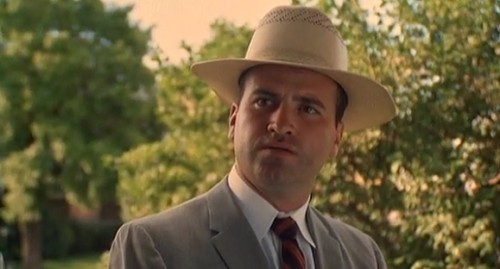Terence Malick’s new film, Treee of Life, has debuted at Cannes, and as is drearily predictable, it’s already causing waves of controversy. Booing, walkouts, endless vitriol, critics and viewers exchanging invective — the only difference between this and his other films is that now people are having the arguments on Twitter. Every argument over Malick’s films has already been had, and it probably won’t do any good to rehash the arguments. I am saying nothing original here, merely venting a personal frustration I have at some of the critical reaction to his work. I haven’t seen Tree of Life, of course, and maybe it sucks. But he’s never made anything close to a bad movie, as far as I’m concerned, and is one of the very few authentic geniuses in the medium America has ever produced. His work is visually stunning to the point of being nearly unimpeachable; it has an emotional impact that belies its narrative simplicity; and it is willing to take chances that almost no one in the realm of commercial filmmaking would dare to take. So there’s my bias, laid out right here at the beginning.
If people hate him, they hate him, and there’s not much I can do about that, but I think part of the problem is that he’s making movies that are trying to do things beyond — or at least on a different track from — what most movies are trying to do, so people are judging him by standards he’s not really trying to meet. And that’s one of the reasons that so many critical assessments of his work seem pretentious or misguided or whatever; for a mainstream director, he’s perilously close to being an experimental filmmaker, and most critics both inside and outside of academia don’t really have the language to describe experimental film on its own terms. It’s like Conrad Hall says — it’s hard to articulate a lot of the visual subtleties of film, because we lack the proper metaphors to convey their emotional impact.
Malick’s stuff is closer to poetry than to narrative, and closer to music than to poetry. His sharpest thematic tool is portraying the immediacy and permanence of nature, and that’s something that’s devilishly hard to do with any kind of a traditional narrative (I think only Herzog has really been successful in that regard). What kind of a story, what kind of a narrative can you shape that adequately delivers the emotional impact that nature has on people? So you end up with comments like Andrew O’Hehir over at Salon; his review of Tree is mostly positive, but he says it doesn’t have anything close to a successful standard narrative, as if that’s a legitimate criticism. It would be for, say, John Ford, or Martin Scorsese, or even the Coen Brothers. But it doesn’t have anything to do with what Terence Malick is trying to do. I can’t imagine anyone who understands him trying to apply that criticism to James Joyce, but people still throw it at Malick all the time; while I wouldn’t say that Malick has the same goals or concerns as Joyce did, I do think they’re equally placed in terms of trying to do something radically different with the media in which they work.
It’s frustrating to me when people who are obviously pushing back against the traditional constraints of a medium are judged as if they were required to play by the same roles as everyone else. Intelligent critics stopped asking a long time ago why, say, Ornette Coleman wasn’t playing the same kind of jazz as everybody else; but they’re still wondering how come Terence Malick can’t tell a narrative story that doesn’t drift. It’s because that’s not what he’s trying to do. And fair enough if that doesn’t work for you; no one says you have to like stream-of-consciousness novels or free jazz or experimental film. People are free to hate it as much as they want. If it’s not for them, they can leave it alone, as do all audiences when selecting what they will watch and judge. What they can’t do, at least if they are critics attempting to recognize what is essential in someone’s work, is to continue to judge it by a set of criteria that do not apply. That’s a profound mistake of judgment, and nothing good can come of it.


That final paragraph is going in my Words to Live By file.
Leonard, have you seen it yet? I just saw it today and was looking forward to reading your take on it if you have in fact now seen it.